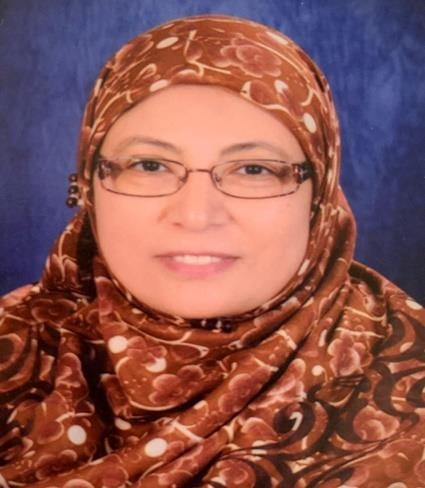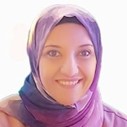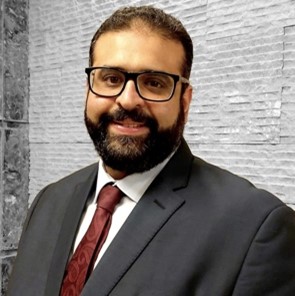About us
The Computational Biomedicine unit was established at the MASRI in 2018 and aims to increase physicians’ awareness and competence in the concept of personalized medicine to become a leading center in the Middle East for bioinformatics and personalized medicine. To achieve this goal, the unit applies to many bodies to obtain sufficient funding and participates in several projects, the most important of which is the MATREX project.
The field of bioinformatics and computational biology is one of the hottest interdisciplinary scientific areas nationally and internationally. This field has recently grown out of traditional fields such as health informatics, biostatistics, information sciences, computer sciences, molecular biology, and genetics. It has grown rapidly due to the enormous amounts of complex data generated by the Human Genome Project and related research, and the concomitant need for sophisticated data analysis. It is essential for the conduct of contemporary life sciences research. Thus, bioinformatics is not only an area of primary research, but its technology is also critical for research in all the life sciences.
To date, biological knowledge is defined, organized, accessed and analyzed via national bioinformatics clusters. Until recently, bioinformatics applications in almost all scientific and industrial fields are crucial interdisciplinary that were largely exclusive to countries with advanced scientific resources. Bioinformatics research plays a vital role in the management and analysis of national biological data and indigenous species. For instance, one utmost application of Bioinformatics research is constructing a national reference genomes database to understand population variations and therefore developing personalized medicine systems, diagnostic tools and solving our own epidemic problems.
Scientific goals
The main goal is to empower bioinformatics research capacity in Egypt through establishing the Computational Biomedicine unit in MASRI as a central hub for life science innovation and information-based technologies discoveries that directly impact both national and regional state’s economies.
By empowering Egyptian researchers to maximize the scientific benefits from computing resources and perform advanced data analysis, the unit seeks to establish an independent community of bioinformatics specialists who share data, carry out best practices and collaborate on projects.
Also, maintaining a balance between basic and translational research. The basic research includes evolutionary biology, structural bioinformatics, macromolecular dynamics, etc. On the translational side, different activities will benefit in the healthcare sector such as the systematic discovery of biomarkers of different prevalent diseases in Egypt, designing genomics-based diagnostic tools for predicting cancer susceptibility and computational design of lead compounds, etc.
Promotion of young researchers
The Computational Biomedicine unit provides different training and Internship programs on bioinformatics for all Egyptian scientists who are at different levels of their academic careers. Either International or National University and Research center can apply for both research and industrial collaboration especially research topics that aim to solve Egyptian society problems in medicine, agriculture, and the environment.
Graduate students can do part of their master thesis specifically the part related to computational biology and bioinformatics in our center, we will provide extensive courses that can support their theses aim. Then we can collaborate with the trainees in future research work.
Researcher and graduate students can use our server with most common bioinformatics tools, with the requested computational power according to their research agreement with our center.
We provide consultancy services for the young Egyptian researchers starting from the beginning of the experimental design step up to interpreting their research findings, hence we can secure that the wet lab part will achieve the answer to their research question using our built-in bioinformatics pipelines.
List of services
* Consulting in experimental design for high-throughput genomic studies and bioinformatic questions.
* Next-Generation Sequencing data analysis including:
* RNA-Seq analysis (Gene expression analysis) ==> Identify gene expression pattern correlate with disease in question:
* Data pre-processing (strand control, ribosome contamination and quality filtering, adapter trimming, read pairing, QC), read mapping to a reference genome, differential expression analysis at gene/transcript level.
* miRNA-Seq analysis ==> Analyze regulatory element responsible for difference in gene expression level:
* Data pre-processing (quality filtering, adapter trimming, size distribution of mature miRNAs, QC), read mapping to a reference genome, differential expression analysis.
* DNA-Seq analysis (Whole Exome/Genome Sequencing) ==> Variant calling analysis.
* ChIP-seq (Methylome analysis): Data pre-processing, read mapping, peak calling.
* Protein modeling ==> Study the effect of identified mutation on the protein level.
* 16S rRNA-Seq analysis: Data pre-processing (read quality control, filtering, trimming, assembling), OTU assignment, taxa abundances profile.
* Metagenomics (Shotgun sequencing).
* Disease Network Analysis.
Bioinformatics training:
Hands-on workshops and experiential learning on basic and advanced bioinformatics techniques provided by MASRI Bioinformatics specialists to undergraduate/postgraduate students, researchers, faculty staff members from different scientific specialties:
* Introduction to bioinformatics tools.
* Linux – command line – shell scripting
* NGS data analysis:
- RNA-seq
- Variant calling
* Downstream data analysis:
- Gene functional analyses
- Pathways and networking
Stakeholders
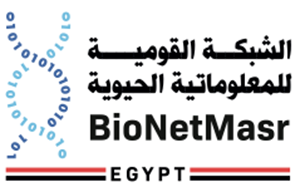 |
 |
 |
|
African Genomics Data Hub (AGDH) |
Research and Publication
Research activity and international collaboration
Dr. Enas Ahmed Fouad ElHady has actively participated by a project in ASBCB Omics Codeathon held by the African Society for Bioinformatics and Computational Biology (ASBCB) and supported by the National Institutes of Health (NIH) Office of Data Science Strategy and the University of the Western Cape.
April 2023 event: “Investigating the Genetic Association between Type 2 Diabetes and Dementia”. https://www.asbcb.org/event/codeathon/asbcb-omics-codeathon-april-2023
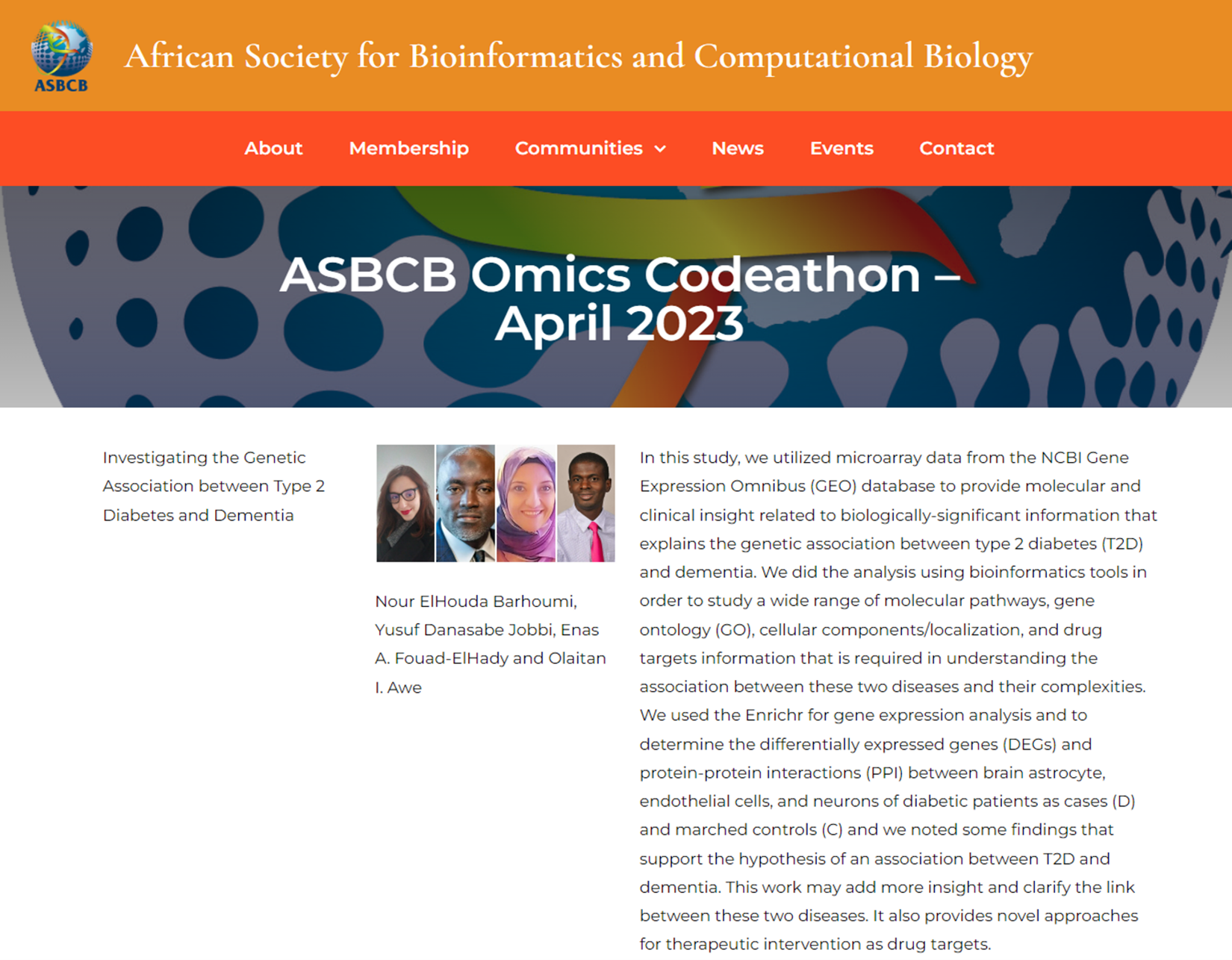
Prof. Samar Kamal and Dr. Enas Ahmed Fouad ElHady actively participated with the interns Huda Azam and Mostafa Ismaiel by a project in ASBCB Omics Codeathon:
October 2023 event: “Breast Cancer Cell Transcriptomics Reveals New Insights into the Genes and Pathways Involved in Anchorage Independence”. -https://www.asbcb.org/event/codeathon/asbcb-omics-codeathon-october-2023
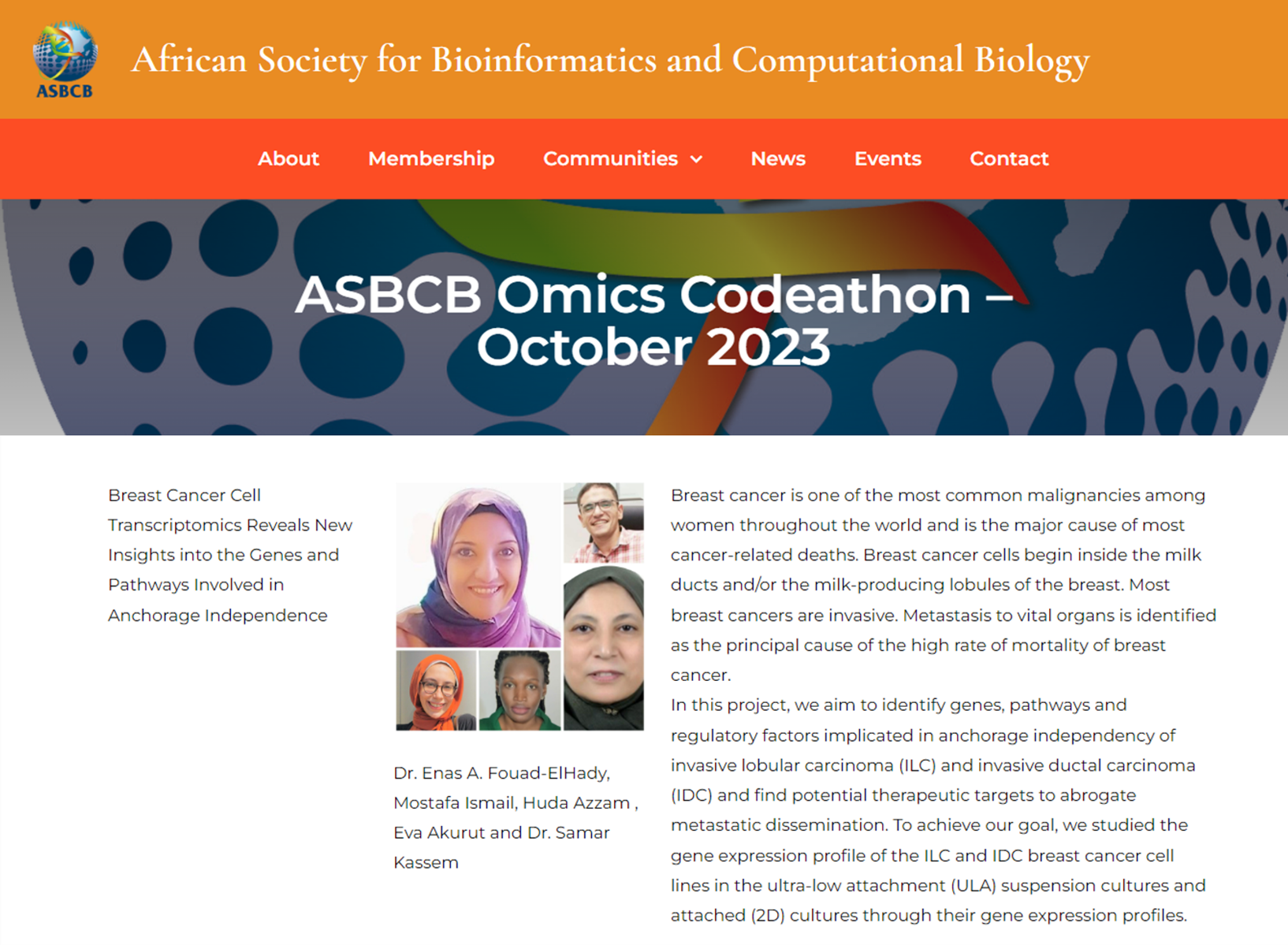
MASRI Bioinformatics team has been awarded the Third Place in the research project category.
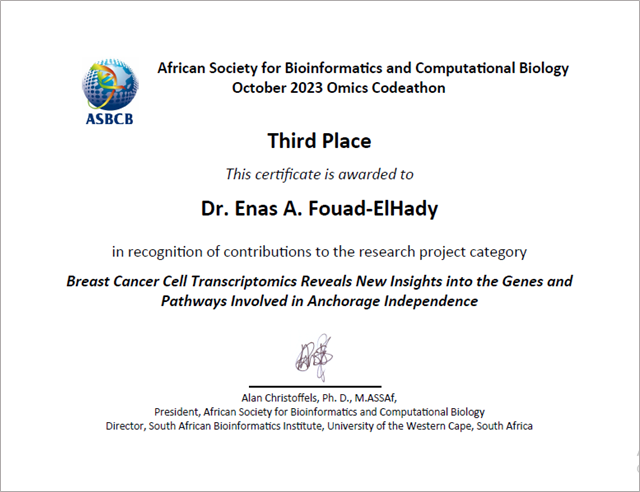
Research publications:
1. Prof. Samar Kamal Kassim:
Manuscripts of last 7 years
https://www.ncbi.nlm.nih.gov/myncbi/samar.kamal%20kassim.1/bibliography/public/
1. Judit Kumuthini, Lyndon Zass, Melek Chaouch, Faisal M Fadlelmola, Nicola Mulder, Fouzia Radouani, Verena Ras, Chaimae Samtal, Milaine SS Tchamga, Dassen Sathan, Anisah Ghoorah, Raphael Z Sangeda, Liberata A Mwita, Upendo Masamu, Samar Kamal Kassim, Zoe Gill, Zahra Mungloo-Dilmohamud, Gordon Wells: Genomic Data Sharing. In Genomics Data Sharing, Academic press publisher, 111-135. https://doi.org/10.1016/B978-0-12-819803-2.00003-1
2. HOURIIYAH TEGALLY, JAMES E. SAN., MATTHEW COTTEN, MONIKA MOIR, BRYAN TEGOMOH, GERALD MBOOWA, DARREN P. MARTIN, CHERYL BAXTER, ARNOLD W. LAMBISIA[...]EDUAN WILKINSON E+393 authorS: The evolving SARS-CoV-2 epidemic in Africa: Insights from rapidly expanding genomic surveillance. SCIENCE, 15 Sep 2022, DOI: 10.1126/science.abq5358
3. Jongeneel C. Victor, Kotze Maritha J., Bhaw-Luximon Archana, Fadlelmola Faisal M., Fakim Yasmina J., Hamdi Yosr, Kassim Samar Kamal, Kumuthini Judit, Nembaware Victoria, Radouani Fouzia, Tiffin Nicki, Mulder Nicola: A View on Genomic Medicine Activities in Africa: Implications for Policy. Frontiers in Genetics (13), 2022. https://doi.org/10.3389/fgene.2022.769919
4. Othman H, Zass L, da Rocha JEB, Radouani F, Samtal C, Benamri I, Kumuthini J, Fakim YJ, Hamdi Y, Mezzi N, Boujemaa M, Okeke CJ, Tendwa MB, Sanak K, Chaouch M, Panji S, Kefi R, Sallam RM, Ghoorah AW, Romdhane L, Kiran A, Meintjes AP, Maturure P, Jmel H, Ksouri A, Azzouzi M, Farahat MA, Ahmed S, Sibira R, Turkson MEE, Ssekagiri A, Parker Z, Fadlelmola FM, Ghedira K, Mulder N, Kamal Kassim S. African Genomic Medicine Portal: A Web Portal for Biomedical Applications. Journal of Personalized Medicine. 2022; 12(2):265. https://doi.org/10.3390/jpm12020265. PMCID: PMC8879570.
5. Wilkinson E, Giovanetti M, Tegally H, et al.,: A year of genomic surveillance reveals how the SARS-CoV-2 pandemic unfolded in Africa. Science. 2021 Oct 22;374(6566):423-431. doi: 10.1126/science.abj4336. Epub 2021 Sep 9. PubMed PMID: 34672751; PubMed Central PMCID: PMC7613315.
6. Fadlelmola FM, Ghedira K, Hamdi Y, Hanachi M, Radouani F, Allali I, Kiran A, Zass L, Alsayed N, Fassatoui M, Samtal C, Ahmed S, Da Rocha J, Chaqsare S, Sallam RM, Chaouch M, Farahat M, Ssekagiri A, Parker Z, Adil M, Turkson M, Benchaalia A, Benkahla A, Panji S, Kassim S, Souiai O, Mulder N: H3ABioNet genomic medicine and microbiome data portals hackathon proceedings. Database (Oxford). 2021 Apr 17;2021:baab016. doi: 10.1093/database/baab016. PMID: 33864455
7. Hamdi Y, Zass L*, Othman H,* Radouani F, Allali I, Hanachi M, Okeke CJ, Chaouch M, Tendwa MB, Samtal C, Sallam RM, Alsayed N, Turkson M, Ahmed S, Benkahla A, Romdhane L, Souiai O, Bishop OT, Ghedira K, Fadlelmola FM, {Mulder N, Kassim SK}: Human OMICs and Computational Biology Research in Africa: Current Challenges and Prospects. OMICS A Journal of Integrative Biology 25 (4): 2021. DOI: 10.1089/omi.2021.0004. PMCID: PMC80607177.
8. Choudhury A, Aron S, Botigué LR, Sengupta D, Botha G, Bensellak T, Wells G, Kumuthini J, Shriner D, Fakim YJ, Ghoorah AW, Dareng E, Odia T, Falola O, Adebiyi E, Hazelhurst S, Mazandu G, Nyangiri OA, Mbiyavanga M, Benkahla A, Kassim SK, Mulder N, Adebamowo SN, Chimusa ER, Muzny D, Metcalf G, Gibbs RA, Rotimi C, Ramsay M, Adeyemo AA, Lombard Z, Hanchard NA. High-depth African genomes inform human migration and health. Nature. 2020 Oct;586(7831):741-748. doi: 10.1038/s41586-020-2859-7. Epub 2020 Oct 28. PubMed PMID: 33116287.
9. Aron S, Jongeneel CV, Chauke PA, Chaouch M, Kumuthini J, Zass L, Radouani F, Kassim SK, Fadlelmola FM, Mulder N. Ten simple rules for developing bioinformatics capacity at an academic institution. PLoS Comput Biol. 2021 Dec 9;17(12):e1009592. doi: 10.1371/journal.pcbi.1009592. PMID: 34882684; PMCID: PMC8659687.
10. Radouani F, Zass L, Hamdi Y, Rocha JD, Sallam R, Abdelhak S, Ahmed S, Azzouzi M, Benamri I, Benkahla A, Bouhaouala-Zahar B, Chaouch M, Jmel H, Kefi R, Ksouri A, Kumuthini J, Masilela P, Masimirembwa C, Othman H, Panji S, Romdhane L, Samtal C, Sibira R, Ghedira K, Fadlelmola F, Kassim SK, Mulder N. A review of clinical pharmacogenetics Studies in African populations. Per Med. 2020 Mar;17(2):155-170. doi: 10.2217/pme-2019-0110. Epub 2020 Mar 3. Review. PubMed PMID: 32125935.
11. Nembaware V; African Genomic Medicine Training Initiative, Mulder N.: African Genomic Medicine Training Initiative, Mulder N2.The African Genomic Medicine Training Initiative (AGMT): Showcasing a Community and Framework Driven Genomic Medicine Training for Nurses in Africa. Front Genet. 2019 Dec 20;10:1209. doi: 10.3389/fgene.2019.01209. eCollection 2019. PMID: 31921282.
12. Aron, Shaun et al. H3ABioNet: Developing Sustainable Bioinformatics Capacity in Africa. EMBnet.journal, [S.l.], v. 23, p. e886, may 2017. ISSN 2226-6089. Available at: . Date accessed: 29 aug. 2021. doi:https://doi.org/10.14806/ej.23.0.886.
13. Ahmed MY, Salah MM, Kassim SK, Elayat WM, Mohamed DA and Zahra FA: Evaluation of the diagnostic and therapeutic roles of non-coding RNA and cell proliferation related gene association in hepatocellular carcinoma. Gene (706): Available online April 26, 2019. https://doi.org/10.1016/j.gene.2019.04.054
14. Ibrahim H. Borai, Ahmed F. Soliman, Hadeer M. Ahmed, Gihan F. Ahmed, and Samar K. Kassim (2018): Association of MTHFR C677T and ABCA1 G656A polymorphisms with obesity among Egyptian children. Gene Reports, 11: 143-149. 10.1016/j.genrep.2018.03.011
15. Sawsan Aboul-Fotouh, Mohamed Habib, Tarek Asaad, Samar K. Kassim and Mohamed H. Ghanem (2018): Behavioral effects of toll-like receptor-4 antagonist ‘eritoran’ in an experimental model of depression: role of prefrontal and hippocampal neurogenesis and γ-aminobutyric acid/glutamate balance. Behavioural Pharmacology, 29 :413-425. PMID: 29561292, DOI: 10.1097/FBP.0000000000000390
16. S El Sayed, E Khairy, AR Basheer, WS Zaki, GF Ahmad, SK Kassim (2018): Evaluation of leptin and MMP2 genes methylation in childhood obesity. Gene Reports 11: 79-86. 10.1016/j.genrep.2018.02.006
17. Hamdy M, Kassim SK, Khairy E, Maher M, Mansour KA, Albreedy AM. (2018): Ghrelin gene polymorphism as a genetic biomarker for prediction of therapy induced clearance in Egyptian chronic HCV patients. Gene. 2018 Jan 25. pii: S0378-1119(18)30098-2. doi: 10.1016/j.gene. 2018.01.077. [Epub ahead of print]. PMID: 29374597.
18. Aboul-Fotouh S, Hassan D, Habib M, Amin AI, Kassim SK, and Mohamed AS (2018): Biochemical studies of hippocampal gene expression of brain-derived neurotropic factor and toll-like receptor-4 in diabetic rats exposed to chronic stress: effects of antidepressant drugs. Asian J of Pharmaceutical and Clinical Research; (11): 271-7. 10.22159/ajpcr.2018.v11i1.21593
19. S.K. Kassim, S.M. Kamal, H.H. Shehata, M.M. Salib, M.L. Louka, M.M. Sallam, L.M. Nabegh (2017): Evaluation of serum fibrotic markers; CTGF, IL-17and TGF-β1 versus liver biopsy for detection of hepatic fibrosis in Egyptian patients with chronic hepatitis C. Meta Gene (13): 63-69. https://doi.org/10.1016/j.mgene.2017.05.003
20. Nicola J. Mulder Correspondence information about the author Nicola J. Mulder Email the author Nicola J. Mulder, Ezekiel Adebiyi, Marion Adebiyi, Seun Adeyemi, Azza Ahmed, Rehab Ahmed, Bola Akanle, Mohamed Alibi, Don L. Armstrong, Shaun Aron, Efejiro Ashano, Shakuntala Baichoo, Alia Benkahla, David K. Brown, Emile R. Chimusa, Faisal M. Fadlelmola, Dare Falola, Segun Fatumo, Kais Ghedira, Amel Ghouila, Scott Hazelhurst, Itunuoluwa Isewon, Segun Jung, Samar Kamal Kassim, Jonathan K. Kayondo, Mamana Mbiyavanga, Ayton Meintjes, Somia Mohammed, Abayomi Mosaku, Ahmed Moussa, Mustafa Muhammd, Zahra Mungloo-Dilmohamud, Oyekanmi Nashiru, Trust Odia, Adaobi Okafor, Olaleye Oladipo, Victor Osamor, Jellili Oyelade, Khalid Sadki, Samson Pandam Salifu, Jumoke Soyemi, Sumir Panji, Fouzia Radouani, Oussama Souiai, Özlem Tastan Bishop, and The H3ABioNet Consortium, as members of the H3Africa Consortium (2017): Development of Bioinformatics Infrastructure for Genomics Research in H3Africa. Global Heart; 12: 91-98. DOI: http://dx.doi.org/10.1016/j.gheart.2017.01.005
21. Nicola J Mulder, Ezekiel Adebiyi, Raouf Alami, Alia Benkahla, James Brandful, Seydou Doumbia, Dean Everett, Faisal M Fadlelmola, Fatima Gaboun, Simani Gaseitsiwe, Hassan Ghazal, Scott Hazelhurst, Azeddine Ibrahimi, Winston Hide, Yasmina Jaufeerally Fakim, Victor Jongeneel, Fourie Joubert, Samar Kassim, Jonathan Kayondo, Judit Kumuthini, Sylvester Lyantagaye, Julie Makani, Ahmed Mansour Alzohairy, Daniel Masiga, Ahmed Moussa, Oyekanmi Nash, Odile Ouwe Missi Oukem-Boyer, Ellis Owusu-Dabo, Sumir Panji, Hugh Patterton, Fouzia Radouani, Khalid Sadki, Fouad Seghrouchni, Özlem Tastan Bishop, Nicki Tiffin, Nzovu Ulenga, and H3ABioNet Consortium (2016): H3ABioNet, a sustainable Pan-African Bioinformatics Network for Human Heredity and Health in Africa. Genome Res. 26: 271-7, doi: 10.1101/gr.196295.115. Epub 2015 Dec 1.
22. H3Africa Consortium (2014): Enabling the genomic revolution in Africa. Science.;344 (6190):1346-8. doi: 10.1126/science.1251546.
http://www.ncbi.nlm.nih.gov/pubmed/?term=Enabling+the+genomic+revolution+in+Africa.
23. Islam Ibrahim Amin, Aboul Ella Hassanien, Samar K. Kassim, Hesham A. Hefny (2014): Visualizing and Identifying the DNA Methylation Markers in Breast Cancer Tumor Subtypes. In: Proceedings of the Fifth International Conference on Innovations in Bio-Inspired Computing and Applications IBICA 2014 Advances in Intelligent Systems and Computing, At VSB-Technical University of Ostrava, Ostrava, Czech republic, Springer; 303, 161-171. http://link.springer.com/chapter/10.1007/978-3-319-08156-4_17
24. Kamal SM, Kassim SK, Ahmed AI, Mahmoud S, Bahnasy KA, Hafez TA, Aziz IA, Fathelbab IF, Mansour HM. (2014): Host and viral determinants of the outcome of exposure to HCV infection genotype 4: a large longitudinal study. Am J Gastroenter; 109(2):199-211. doi: 10.1038/ajg.2013.427. Epub 2014 Jan 21.
Books & Book Chapters
1. Judit Kumuthini, Lyndon Zass, Melek Chaouch, Faisal M Fadlelmola, Nicola Mulder, Fouzia Radouani, Verena Ras, Chaimae Samtal, Milaine SS Tchamga, Dassen Sathan, Anisah Ghoorah, Raphael Z Sangeda, Liberata A Mwita, Upendo Masamu, Samar Kamal Kassim, Zoe Gill, Zahra Mungloo-Dilmohamud, Gordon Wells: Genomic Data Sharing. In Genomics Data Sharing, Academic press publisher, 111-135. https://doi.org/10.1016/B978-0-12-819803-2.00003-1
2. Mohammed A. Farahat, A. Abdo, Samar Kamal Kassim: A Systematic Literature Review of DNA-Based Steganography Techniques: Research Trends, Data Sets, Methods, and Frameworks. In: Magdi D.A., Helmy Y.K., Mamdouh M., Joshi A. (eds) Digital Transformation Technology. Lecture Notes in Networks and Systems, vol 224. Springer, Singapore. https://doi.org/10.1007/978-981-16-2275-5_31.
3. Islam Ibrahim Amin, Aboul Ella Hassanien, Samar K. Kassim, Hesham A. Hefny: Big DNA Methylation Data Analysis and Visualizing in a Common Form of Breast Cancer. In Big Data in Complex Systems: Challenges and Opportunities, pp: 275-391. Publisher: Springer-Verlag, Germany, Editors: Aboul Ella Hassanien, Ahmad Taher Azar, Vaclav Snasel, Janusz Kacprzyk, Jemal H. Abawajy, 2014.http://www.springer.com/gp/book/9783319110554
4. Sanaa Eissa, Lilian Ramzy, Samar Kassim. Methylation of APC tumor suppressor gene In bladder cancer : Molecular Screening for Bladder Cancer Project PI: Prof Sanaa Eissa, Medical Biochemistry & Molecular biology department. First edited by Sanaa Eissa, 01/2012; LAP Lambert Academic Publishing AG & Co KG. ISBN: 978-3-8484-1376-8.https://www.exlibris.ch/de/buecher-buch/english-books/ramzy-lilian/methylation-of-apc-tumor-suppressor-gene-in-bladder-cancer/id/9783848413768
5. A. Sharaf Eldin, , S. AbdelGaber, , T. Soliman, , S. Kassim and , A. Abdo:A Comparative Study of Protein Sequence Clustering Algorithms. In “Innovations in Computing Sciences and Software Engineering”. pp 373-378. Eds.: Sobh TareK and Ellaithy Khaled, 2010. Published by: Springer Netherlands, Copyright holder: Springer Science+Business Media B.V. http://link.springer.com/chapter/10.1007%2F978-90-481-9112-3_63. Doi>10.1007/978-90-481-9112-3_63, Print ISBN: 978-90-481-9111-6, Online ESBN: 978-90-481-9112-3.
6. Bast, R.C. et al. (1995). Cell growth regulation in ovarian cancer: tyrosine kinases, tyrosine phosphatases and tumour necrosis factor-α . In: Sharp, F., Mason, P., Blackett, T., Berek, J. (eds) Ovarian Cancer 3. Springer, Boston, MA. https://doi.org/10.1007/978-1-4757-0136-4_11، https://doi.org/10.1007/978-1-4757-0136-4_11
Abstracts
1. Wiener, S.K. Kassim, A. Berchuck, R.C. Bast, Jr. 1993. Role of Protein Tyrosine Kinases and Protein Tyrosine Phophatases in Human Ovarian and Mammary Cancer Cell Growth. 2nd International Symposium on Cancer Molecular Biology. Cairo, Egypt.
2. Wiener, S.K. Kassim, A. Berchuck, R.C. Bast, Jr. 1994. Differential Expression of Protein Tyrosine Phosphatases in Human Ovarian Adenocarcinomas. American Association for Cancer Research. San Francisco, CA, USA.
3. Bast, Jr., Jon Wiener, S.K. Kassim, S. Wu, C. Boyer, K. DeSombre, J. Hurteau, G. Rodriguez, G. Mills, and A. Berchuck.Cell Growth Regulation in Ovarian Cancer: Tyrosine Kinases, Tyrosine Phosphatases and Tumor Necrosis Factor-a. Helene Harris symposium, Toronto, Canada.
2. Dr. Enas A. Fouad ElHady, PhD
# Research Articles:
* Enas A. Fouad-Elhady, Hadeer A. Aglan, Rasha E. Hassan, Gilane M. Sabry, Hanaa H. Ahmed (2022): Nanoplatforms for Promoting Osteogenesis in Ovariectomy-Induced Osteoporosis in the Experimental Model. Current Nanomedicine, 12. DOI: 10.2174/2468187312666220217104650
* Enas A. Fouad-Elhady, Hadeer A. Aglan, Rasha E. Hassan, Hanaa H. Ahmed, Gilane M. Sabry (2020): Modulation of bone turnover aberration: A target for management of primary osteoporosis in experimental rat model. Heliyon. 6(2): p.e03341. DOI:10.1016/j.heliyon.2020.e03341.
* Hanaa H. Ahmed, Gamal A. Elmegeed, El-Sayd M.E. Mahdy, Wafaa Gh. Shousha, and Enas A. Fouad-Elhady (2009): Efficacy of newly synthesized melatonin derivatives as antiosteoporotic agents in ovariectomized rats. Journal of Applied Sciences Research. 5(3): pp.263–282. ISSN: 1816157X
# Book
published via LAMBERT academic publishing (Germany):
Hanaa Ahmed, Gamal A. Elmegeed and Enas Elhady (2010): New insights on osteoporosis. No. 13291. ISBN 978-3-8433-7530-6.
About the Book
is widely recognized as a major public health problem. It is a serious metabolic bone disorder that often results in hip fracture and is usually asymptomatic in its initial stages. It is mainly seen in elderly people as decreased quantities of sex hormones is one important factor causing bone loss. Most patients suffering from osteoporosis are post-menopausal women exhibiting loss of estrogen. Also, menopause is associated with a substantial decline in melatonin secretion which subsequently stimulates bone resorption. Numerous drugs are approved for both the prevention and treatment of osteoporosis but with multiple side effects. This book, therefore, provides new insights for developing novel melatonin analogues containing heterocyclic moieties that could be expected to be alternative modalities for prevention and intervention of osteoporosis in ovariectomized rats as an experimental model for postmenopausal osteoporotic women. Our finding could be useful for future strategies for osteoporosis management in postmenopausal women.
3. Dr. Mohamed ElHadidi:
Published Journal Articles since 2019
1. A. M. Serag, M. S. Abd El-Sabour, Rashed M. A, El-Hadidi Mohamed, Mohamad Maged, M. Magdy, Refaat, M. H.: Comparing the gut bacteria from Nile tilapia fish inhabiting some Egyptian northern lakes using high-throughput sequencing of the 16S rRNA gene (2022), Applied Biochemistry and Biotechnology, IFP 2.78.
2. Mohamed Emam, Mariam Oweda, AgostinhoAntunes and MohamedEl-Hadidi (2021): Positive selection as a key player for SARS-CoV-2 pathogenicity: Insights into ORF1ab, S and E genes, Virus Research, IF: 3.44.
3. Reem Hassan, Marwa Tantawy, Nouran Gouda, Mariam Elzayat, Sara Gabra, Amena Nabih, Aya Diab, Mohamed El-Hadidi, Usama Bakry, Mohamed Refaat, Mervat El-Annany, Lobna Shalaby and Ahmed Sayed, (2020) : Genotypic characterization of multiple drug resistant Escherichia coli isolates from a pediatric cancer hospital in Egypt, Scientific Reports, IF: 5.1
4. Yogesh Singh, Mohamed El Hadidi, Jakob Matthes, Zinah Wassouf, Julia M Schulze-Hentrich, Ursula Kohlhofer, Leticia Quintanilla-Martinez de Fend, Daniel Huson, Olaf Riess, Nicolas Casadei (2019): Enriched environmental conditions modify the gut microbiome composition and fecal markers of inflammation in Parkinson's disease, Front. Neurosci., IF: 99.
5. ME El-Houseini, A Ismail, AA Abdelaal, AH El-Habashy, ZF Abdallah, MZ Mohamed, M El-Hadidi, WCS Cho, H Ahmed, TA Al-Shafie (2019): Role of TGF-β1 and C-Kit Mutations in the Development of Hepatocellular Carcinoma in Hepatitis C Virus-Infected Patients: in vitro Study, Journal of Biochemistry (Moscow), IF: 2.57.
6. Angela C Poole, Julia K Goodrich, Nicholas D Youngblut, Guillermo G Luque, Albane Ruaud, Jessica L Sutter, Jillian L Waters, Qiaojuan Shi, Mohamed El-Hadidi, Lynn M Johnson, Haim Y Bar, Daniel H Huson, James G Booth, Ruth E Ley (2019): Human salivary amylase gene copy number impacts oral and gut microbiomes, Cell host & microbe, IF: 21.
Published Conference Articles Since 2019
1. Nourelislam Awad and Mohamed El Haddi: A Framework for Alternative Splicing Isoforms Detection in Lung Cancer (2021), 10th International Conference on Intelligent Computing and Information Systems (ICICIS).
2. Mariam Oweda, Joseph N. Tanyous and Mohamed Hamed and Mohamed Hadidi: Potential Probiotics for Viral Triggered Type 2 Diabetes (2021), IEEE Novel Intelligent and Leading Emerging Sciences conference.
3. Eman Abdelrazik, Mariam Oweda and Mohamed El-Hadidi: Benchmarking of Antimicrobial Resistance Gene Detection Tools in Assembled Bacterial Whole Genomes (2021), IEEE Novel Intelligent and Leading Emerging Sciences conference.
4. Mohamed Emam, Amna Ali, Eman Abdelrazik, Mustafa Elattar and Mohamed El-Hadidi: Detection of Mammalian Coding Sequences Using a Hybrid Approach of Chaos Game Representation and Machine Learning (2020): 2020 IEEE International Conference on Bioinformatics and Biomedicine (BIBM).
5. Ghadir Ali, Ahmed Shahin , Mohamed El-Hadidi and Mustafa Elattar: Convolutional Neural Network with Attention Modules for Pneumonia Detection (2020): International Conference on Innovation and Intelligence for Informatics, Computing and Technologies (3ICT).
6. Mohamed Abuelanin, Mohamed Fares and Mohamed El-Hadidi: Insilico Codon Bias Correction for Transgenic Biological Protein Sequences for Vaccine Production: (2020): IEEE Novel Intelligent and Leading Emerging Sciences conference.
7. In-Silico Comparative Analysis of Egyptian SARS CoV-2 with Other Populations: a Phylogeny and Mutation Analysis: Lamis Sharawy, Maha Tantawy, Yara Ahmed, Ahmed Taha, Tamer M Ibrahim, Omar Soliman and Mohamed El-Hadidi (2020): IEEE Novel Intelligent and Leading Emerging Sciences conference.
8. Amira Yousef, Ali Kishk, Mohamed EL-Hadidi, Abdelrahman Zekri: Profiling of BRCA1 & BRCA2 mutations in Egyptian Colorectal Cancer Patients via Next Generation Sequencing (2020), American Association for Cancer Research, San Diego, CA, USA.
9. Ali Kishk and Mohamed El-Hadidi: AmpliconNet: Sequence Based Multi-layer Perceptron for Amplicon Read Classification Using Real-time Data Augmentation (2019): IEEE International Conference on Bioinformatics and Biomedicine (BIBM), Madrid, Spain.
4. Dr. Omar Samir:
Published Journal Articles (2020-2021)
1. Jalal D, Elzayat MG, Diab AA, El-Shqanqery HE, Samir O, Bakry U, Hassan R,Elanany M,Shalaby L, Sayed AA, 202 Deciphering Multidrug-Resistant Acinetobacter baumannii from a Pediatric Cancer Hospital in Egypt. mSphere 6:e00725-21.
2. Labib, M.M., Amin, M.K., Alzohairy, A.M., Elashtokhy, M.M.A., Samir, O., Saleh, I., Arif, I.A., Osman, G.H. and Hassanein, S.E., 2020. In silico Targeting, inhibition and analysis of polyketide synthase enzyme in Aspergillus ssp. Saudi Journal of Biological Sciences, 27(12), pp.3187-3198.
3. Mai M. Labib, M. K. Amin, A. M. Alzohairy, M. M. A. Elashtokhy, O. Samir & S. E. Hassanein (2022) Inhibition analysis of aflatoxin by in silico targeting the thioesterase domain of polyketide synthase enzyme in Aspergillus ssp, Journal of Biomolecular Structure and Dynamics, 40:10, 4328-4340.
4. L. Sharawy et al., "In-Silico Comparative Analysis of Egyptian SARS CoV-2 with Other Populations: a Phylogeny and Mutation Analysis," 2020 2nd Novel Intelligent and Leading Emerging Sciences Conference (NILES), Giza, Egypt, 2020, pp. 618-622, doi: 10.1109/NILES50944.2020.9257918.
Awards
Prof. Samar Kamal Abdel Hameed Kassim
* جائزة جامعة عين شمس للنشر الدولي ٢٠٢٠، ٢٠٢١.
* جائزة التميز في النشر الدولي مقدمة من النقابة العامة للأطباء بجمهورية مصر العربية 2013.
* جائزة المرحوم أ.د. ممتاز محمد الصاوى فى مجال الطب المعملى و أمراض الدم (إحدى جوائز الهيئات و الأفراد الممنوحة من أكاديمية البحث العلمى لعام 2007).
* Molecular Biology Excellency Award (Interlab, Cairo, Egypt, 1998) for the manuscript: Samar K. Kassim, Ibrahim SA, Sanaa Eissa, Sahar SA Zaki, El-Begermy MA, Abdou MH, and Kalifa A.: Molecular Biologic Studies on Epstein-Barr Virus, Human Papilloma Virus, and Flowcytometric Cell Cycle Kinetics in Nasopharyngeal Carcinoma and Inverted Papilloma Among Egyptian Patients. Disease Markers, 14: 113-120, 1998.
Training & Workshops
1. Hands-on workshop: “Shotgun Metagenomic data analysis: Deciphering gut microbiota and breast cancer” in Breast Gynecological International Cancer Conference 16th edition (16th BGICC 2024)
Designed by: Dr. Enas Ahmed Fouad ElHady, PhD
Bioinformatics Specialist - Deputy Director of Computational Biomedicine Unit, Faculty of Medicine Ain Shams Research Institute (MASRI). Secretary-General of the National Bioinformatics Network (BioNetMasr) Executive Committee.
Teaching assistant: Mohamed Said AboHoussien
Junior Bioinformatician, Bachelor of Genetics Al-Azhar University, Intern in Computational Biomedicine Unit Faculty of Medicine Ain Shams Research Institute (MASRI), Member of the National Egyptian Bioinformatics Network (BioNetMasr)
Title: “Shotgun Metagenomic data analysis: Deciphering gut microbiota and breast cancer.”
This workshop will provide an end-to-end pipeline to the profiling of microbial communities from shotgun metagenome data, through an intensive theoretical lecture and a hands-on session. Workshop participants will learn how to process raw sequencing reads through state-of-the-art bioinformatic methods to extract information about taxonomical, functional profiles and pathways.
Lecture: 1 hours
Practical: 2 hours
Introduction to Shotgun metagenomic data analysis using Galaxy, step-by-step instructions for each tool in the analysis pipeline.
1. Processing with quality control/trimming and human genomic reads filtered-out.
2. Taxonomic analyses using different classifiers: MetaPhlan and Kraken2.
3. Visualization (Pavian, KRONA).
4. Functional analyses with metabolic assignation and pathway reconstruction (HUMAnN).
5. Interpretation of results.
6. Demo of local pipeline && wrapping.
Internship & Training
Interns:
 |
Mostafa Ismail Immunoinformatics and computational biologist at Ohio state University USA, Master candidate Faculty of Computers and information Science Ain Shams University, Advanced & Basic Bioinformatics Diplomas from Faculty of Computers and information Science Ain Shams University. Bachelor of Agriculture Ain Shams University. Intern in Computational Biomedicine Unit, Faculty of Medicine Ain Shams Research Institute (MASRI). Member of the National Egyptian Bioinformatics Network (BioNetMasr). |
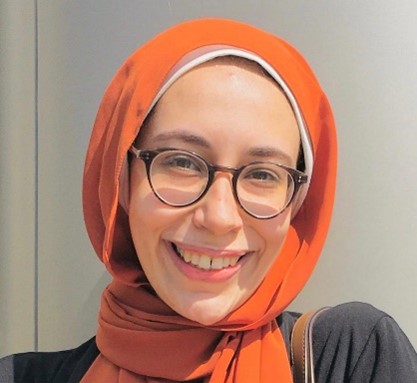 |
Huda Mahfouz Ahmed Mohamed Azzam Junior Bioinformatician, Bioinformatics Professional Diploma Nile University, Bachelor of biotechnology MUST University. Intern in Computational Biomedicine Unit, Faculty of Medicine Ain Shams Research Institute (MASRI). Member of the National Egyptian Bioinformatics Network (BioNetMasr). |
## Mostafa and Huda completed an internship program from date 1/7/2023 to 1/11/2023 in the Computational Biomedicine unit at MASRI under the supervision and guidance of Dr. Enas Ahmed Fouad-ElHady.
She successfully participated in a training project entitled “Breast Cancer Cell Transcriptomics Reveals New Insights into the Genes and Pathways Involved in Anchorage Independence"
* In this program they excelled in several skills, including:
1. Retrieving raw transcriptomic data (Bulk RNAseq) from SRA repository.
2. Transcriptomic analysis, including FASTQ reads preprocessing, sequence alignment and count, differential gene expression analysis, and functional analysis.
3. Proficient utilization of tools:
- Bash command line: FASTQC, Trimmomatic, STAR, Hisat2 & FeatuerCount.
- R packages: DESeq2, EnhancedVolcano & pheatmap.
- Webbased tools: String, KEGG, Enrichr & DAVID.
4. Basics about Nextflow and Cytoscape.
* within MASRI Bioinformatics team, Mostafa and Huda participated in this project in the Omics Codeathon – October 2023 event held by the African Society for Bioinformatics and Computational Biology (ASBCB) and supported by the National Institutes of Health Office of Data Science Strategy (NIH ODSS) and the University of the Western Cape.
This event introduces a collaborative environment by providing weekly meetings for 3 months with international interdisciplinary research teams to present progress in their practical work and share experiences.
Achievement: MASRI Bioinformatics team awarded the Third Place in the research project category.
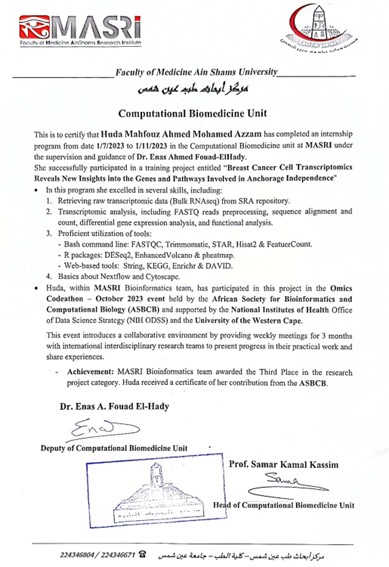
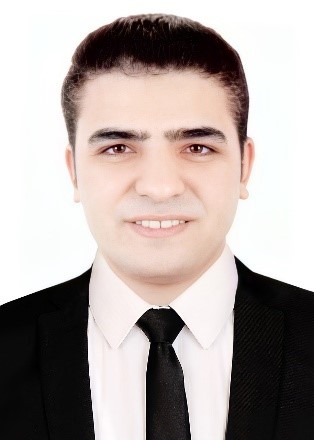 |
Mohamed Said Ahmed Mohamed AboHoussien |
|
In this program Mohamed excelled in several skills, including: Retrieving raw transcriptomic data from SRA repository. FASTQ reads quality check and preprocessing. Transcriptomics (Bulk RNAseq) including sequence alignment and count, differential gene expression analysis, and functional analysis. 16s rRNA sequence analysis & Shotgun Metagenomics including taxonomic and functional profiling. Proficient utilization of tools: Bash command line: FASTQC, MultiQC, Trimmomatic, Hisat2, FeatureCounts, Bowti2, Kraken2, Bracken, Krona, MetaPhlanN, HUMAnN, Diamond, Qiime2, Mothur. R packages: Deseq2, Devtools, ggplot2, Vegan, Microbiomics, Broom, Microeco, Pavian (shinny app), Phinsh, ggtree, Microbiotaprocess. Webbased tools: Galaxy, Enrichr, DAVID, ShinyGO. MEGAN Community Edition Metagenome Analyzer. Basics about Nextflow. Mohamed actively participated in the 16th BGICC 2024 Breast Gynecological & Immunooncology International Cancer Conference through the National Bioinformatics Network BioNetMasr. He delivered a hands-on session entitled "Shotgun metagenomic data analysis: Deciphering gut microbiota and breast cancer" using Galaxy for processing raw metagenome sequencing reads to extract information about taxonomical, functional profiles, and pathways. |
|
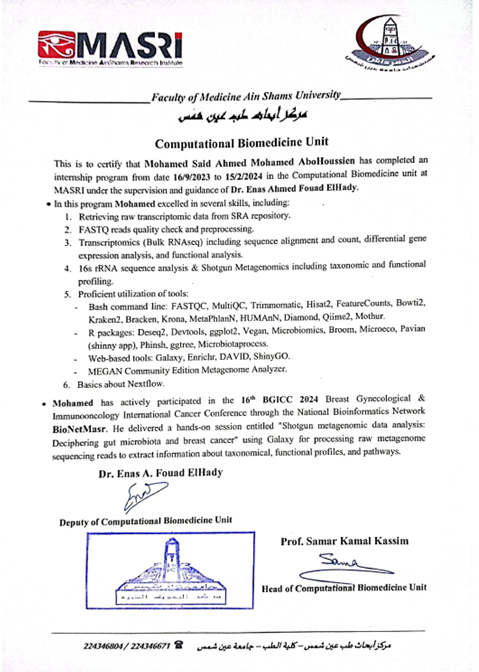
Trainees
Ahmed Bahaa Shalaby
Master candidate Faculty of Computers and information Science Ain Shams University, , Advanced & Basic Bioinformatics Diplomas from Faculty of Computers and information Science Ain Shams University, Professional Bioinformatics Diploma Nile University, Bachelor of Pharmacy Ain Shams University
Trainee in Computational Biomedicine Unit, Faculty of Medicine Ain Shams Research Institute (MASRI). Member of the National Egyptian Bioinformatics Network (BioNetMasr).
Salma Yehia Abd El Moain
Eg-CompBio Bioinformatics and Computational Biology Diploma. Bachelor of Science, Biotechnology department, Cairo University.
Trainee in Computational Biomedicine Unit, Faculty of Medicine Ain Shams Research Institute (MASRI). Member of the National Egyptian Bioinformatics Network (BioNetMasr).
Eshraka Ali Abd ElMageed Mohammed
Master candidate Faculty of Science Ain Shams University, Professional Bioinformatics Diploma Nile University, BSc. of Science Ain Shams University.
Trainee in Computational Biomedicine Unit, Faculty of Medicine Ain Shams Research Institute (MASRI). Member of the National Egyptian Bioinformatics Network (BioNetMasr).
Abdulrhman Sameh Mohammed
Bachelor of Computers and information Science Bioinformatics Department
Trainee in Computational Biomedicine Unit, Faculty of Medicine Ain Shams Research Institute (MASRI). Member of the National Egyptian Bioinformatics Network (BioNetMasr).
Ahmed Rady Abd-Elmordy
3rd Year Student in Bachelor of Science, Bioinformatics department, Benha University.
Trainee in Computational Biomedicine Unit, Faculty of Medicine Ain Shams Research Institute (MASRI). Member of the National Egyptian Bioinformatics Network (BioNetMasr).
Mohamed Saeed Rida
3rd Year Student in Bachelor of Science, Bioinformatics department, Benha University.
Trainee in Computational Biomedicine Unit, Faculty of Medicine Ain Shams Research Institute (MASRI). Member of the National Egyptian Bioinformatics Network (BioNetMasr).
## All trainees completed a practical training program one day per week from date 1/11/2023 to 31/12/2023 in the Computational Biomedicine unit at MASRI under the supervision and guidance of Dr. Enas Ahmed Fouad ElHady.
In this program the trainee excelled in several skills, including:
Retrieving raw transcriptomic data from SRA repository.
Transcriptomic analysis (Bulk RNAseq), including FASTQ reads preprocessing, sequence alignment and count, differential gene expression analysis, and functional analysis.
Proficient utilization of tools:
Bash command line: FASTQC, Trimmomatic, Hisat2 & FeatuerCount.
R packages: DESeq2 & EnhancedVolcano.
Webbased tools: String & DAVID.
Basics about Cytoscape:
Visualization of proteinprotein interaction network generated by String
Identifying hub genes by CytoHubba application.
An introduction to the analysis of shotgun metagenomic data using Galaxy
Taxonomic profiling (kraken2 & MetaPhlan), visualization (Pavian & Krona), Functional profiling (HUMAnN).
## All trainees received their certificates
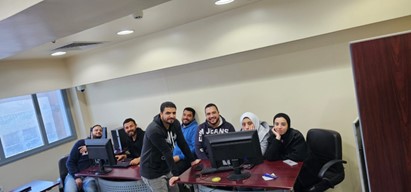 |
|
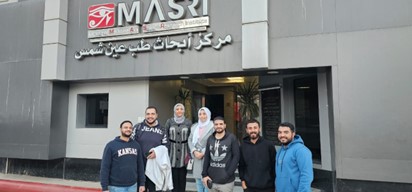 |
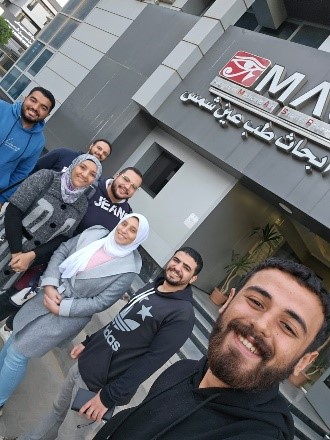 |
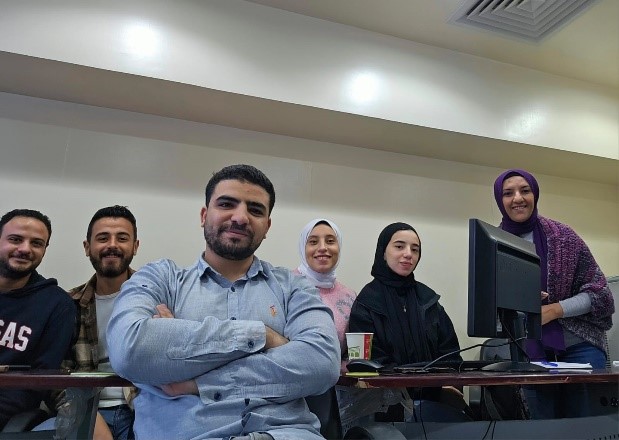 |
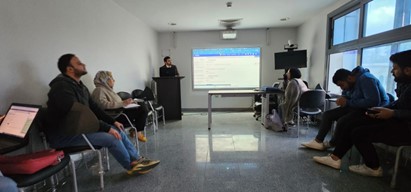 |

